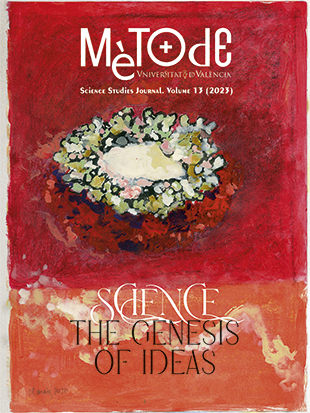More biodiversity to improve our health: The benefits to human well-being of favouring functional and diverse ecosystems
DOI:
https://doi.org/10.7203/metode.13.24072Keywords:
biodiversity, ecosystem services, One Health, zoonoses, prevention Abstract
Abstract
There is ample evidence that contact with nature generates measurable benefits for people’s psychological and physiological health. There is also abundant research showing that well-conserved ecosystems with high levels of biodiversity serve additional functions, including the reduction of risks to human health from animal-borne infections (zoonoses such as Covid-19) or climate change. The United Nations first coined the concept of One Health specifically to encourage the multidisciplinary study of human health in the global context of animal, plant, and ecosystem health, thereby enabling progress towards more preventive and effective medicine.
 Downloads
Downloads
 References
References
Aerts, R., Honnay, O., & Nieuwenhuyse, A. V. (2018). Biodiversity and human health: Mechanisms and evidence of the positive health effects of diversity in nature and green spaces. British Medical Bulletin, 127(1), 5–22. https://doi.org/10.1093/bmb/ldy021
Allen, T., Murray, K. A., Zambrana-Torrelio, C., Morse, S. S., Rondinini, C., Di Marco, M., Breit, N., Olival, K. J., & Daszak, P. (2017). Global hotspots and correlates of emerging zoonotic diseases. Nature Communications, 8, 1124. https://doi.org/10.1038/s41467-017-00923-8
Antunes, T. C., Marconatto, L., Borges, L. G. A., Sueli, A. G., & Van Der Sand, T. (2021). Analysis of microbial community biodiversity in activated sludge from a petrochemical plant. Revista Ambiente & Água, 16(3). https://doi.org/10.4136/ambi-agua.2655
Brown, C., & Grant, M. (2005). Biodiversity and human health: What role for nature in healthy urban planning? Built Environment, 31(4), 326–338.
Díaz, S., Fargione, J., Chapin, F. S. III, & Tilman, D. (2006). Biodiversity loss threatens human well-being. PLoS Biology, 4(8), 1300–1305. https://doi.org/10.1371/journal.pbio.0040277
Engemann, K., Pedersen, C. B., Arge, L., Tsirogiannis, C., Mortensen, P. B., & Svenning, J. (2019). Residential green space in childhood is associated with lower risk of psychiatric disorders from adolescence into adulthood. PNAS, 116(11), 5188–5193. https://doi.org/10.1073/pnas.1807504116
Hartig, T., Mitchell, R., de Vries S., & Frumkin, H. (2014). Nature and health. Annual Review of Public Health, 35, 207–228. https://doi.org/10.1146/annurev-publihealth-032013-182443
Fuller, R. A., Irvine, K. N., Devine-Wright, P., Warren, P. H., & Gaston, K. J. (2007). Psychological benefits of greenspace increase with biodiversity. Biology Letters, 3, 390–394. https://doi.org/10.1098/rsbl.2007.0149
Jones, K., Patel, N., Levy, M. Storeygard, A., Balk, D., Gittleman, J. L., & Daszak, P. (2008). Global trends in emerging infectious diseases. Nature, 451, 990–993. https://doi.org/10.1038/nature06536
Keesing, F., & Ostfeld, R. S. (2021). Impacts of biodiversity and biodiversity loss on zoonotic diseases. PNAS, 118(17), e2023540118. https://doi.org/10.1073/pnas.2023540118
Liang, J., Crowther, T. W., Picard, N., Wiser, S., Zhou, M., Alberti, G., Schulze, E., McGuire, A. D., Bozzato, F., Pretzsch, H., De Miguel, S., Paquette, A., Hérault, B., Scherer-Lorenzen, M., Barrett, C. B., Glick, H. B., Hengeveld, G. M., Nabuurs, G., Pfautsch, S., … Reich, P. B. (2016). Positive biodiversity-productivity relationship predominant in global forests. Science, 354, 6309. https://doi.org/10.1126/science.aaf8957
Manes, F., Marando, F., Capotorti, G., Blasi, C., Salvatori, E., Fusaro, L., Ciancarella, L., Mircea, M., Marchetti, M., Chirici, G., & Munafò, M. (2016). Regulating ecosystem services of forests in ten Italian metropolitan cities: Air quality improvement by PM10 and O3 removal. Ecological Indicators, 67, 425–440. https://doi.org/10.1016/j.ecolind.2016.03.009
Sandifera, P. A., Sutton-Grierb, A. E., & Ward, B. P. (2015). Exploring connections among nature, biodiversity, ecosystem services, and human health and well-being: Opportunities to enhance health and biodiversity conservation. Ecosystem Services, 12, 1–15. https://doi.org/10.1016/j.ecoser.2014.12.007
Schebella, M. F., Weber, E., Schultz, L., & Weinstein, P. (2019). The wellbeing benefits associated with perceived and measured biodiversity in Australian urban green spaces. Sustainability, 11(3), 802. https://doi.org/10.3390/su11030802
Ulrich, R. S. (1984). View through a window may influence recovery from surgery. Science, 224 (4647), 420–421. https://doi.org/10.1126/science.6143402
Downloads
Published
How to Cite
-
Abstract1549
-
PDF762
Issue
Section
License
![]()
All the documents in the OJS platform are open access and property of their respective authors.
Authors publishing in the journal agree to the following terms:
- Authors keep the rights and guarantee Metode Science Studies Journal the right to be the first publication of the document, licensed under a Creative Commons Attribution-NonCommercial-NoDerivatives 4.0 International License that allows others to share the work with an acknowledgement of authorship and publication in the journal.
- Authors are allowed and encouraged to spread their work through electronic means using personal or institutional websites (institutional open archives, personal websites or professional and academic networks profiles) once the text has been published.





